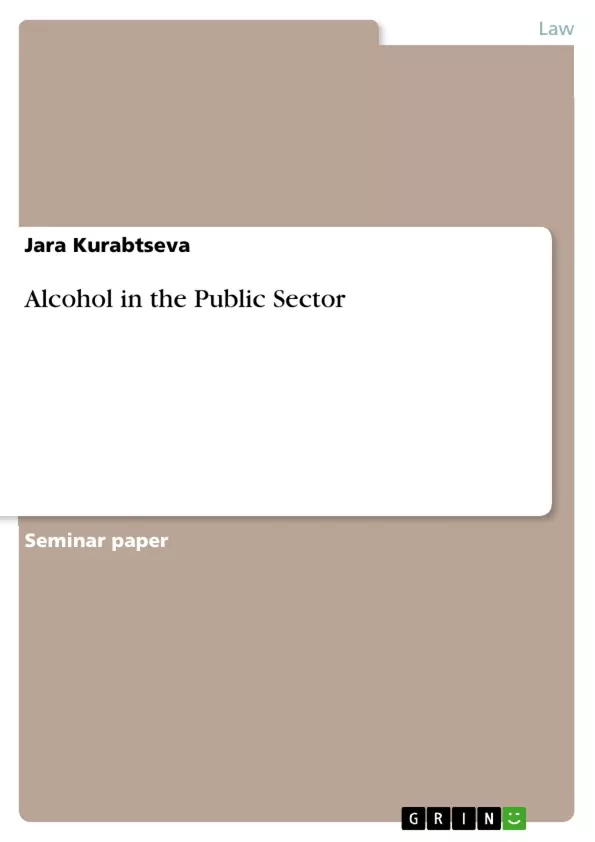This paper addresses alcohol abuse in the public service with special reference to civil service and disciplinary law. First, alcohol addiction as a disease is examined in more detail and its official and physical consequences are then presented. The core of this work is formed by the possible breaches of duty relevant to the topic and their consequences under civil service law. Finally, the employer's duty of care is discussed and explained in relation to the special obligations of addicted civil servants. Due to the legal differences between civil servants and employees, this work deals exclusively with civil servants.
Alcoholism and drug addiction are often not thought to be in the center of our society. But it is precisely where we often do not even expect it that alcohol and drug abuse has become a problem. More and more people are incapacitated due to addiction, and so it is in the civil service.
The civil servant is often described as reliable, punctual and conscientious. He serves the state and acts on behalf of the state. But what happens when people who would not be expected to have these vices suddenly become conspicuous, not only in their private lives but also in their work?
Inhaltsverzeichnis (Table of Contents)
- 1 Introduction
- 2 Alcoholism
- 3 Consequences of alcohol addiction
- 3.1 Physical effects
- 3.2 Effects of the service
- 4 Civil service consequences of alcoholism
- 4.1 Breach of duty by officials due to alcohol abuse (obligation to maintain health § 34 S. 1 BeamtstG)
- 4.2 Duty of the official to cooperate with therapeutic measures
- 4.3 Disciplinary consequences
- 5 Duty of care of the employer
- 5.1 Employer's obligation to intervene
- 6 Conclusion
Zielsetzung und Themenschwerpunkte (Objectives and Key Themes)
This paper examines alcohol abuse in the public sector, focusing on civil service and disciplinary law. It explores alcohol addiction as a disease and its official and physical consequences, detailing potential breaches of duty and their consequences under civil service law. It also discusses the employer's duty of care with regards to the special duties of addicted officials, focusing solely on civil servants due to legal differences between civil servants and employees.
- Alcohol addiction as a disease and its consequences
- Breach of duty by officials due to alcohol abuse
- Disciplinary consequences for alcohol abuse in the public sector
- Duty of care of the employer towards addicted officials
- Legal implications for civil servants with alcohol addiction
Zusammenfassung der Kapitel (Chapter Summaries)
- Chapter 1: Introduction This chapter introduces the issue of alcohol abuse in the public sector, highlighting the challenges it poses for the functioning of the civil service. It emphasizes the importance of examining alcohol addiction as a disease and its implications for the legal framework governing public officials.
- Chapter 2: Alcoholism This chapter provides a comprehensive definition of alcoholism, tracing its historical development from the early observations of Magnus Huss to the contemporary classification system. It presents a detailed account of the five types of alcoholism according to Jellinek, highlighting their distinct characteristics and potential for progression.
- Chapter 3: Consequences of alcohol addiction This chapter examines the multifaceted consequences of alcohol addiction, addressing both its physical effects and its impact on the performance of civil servants. It explores how alcohol abuse can lead to health problems, impact professional conduct, and ultimately hinder the effectiveness of public services.
- Chapter 4: Civil service consequences of alcoholism This chapter delves into the legal ramifications of alcohol abuse for civil servants. It discusses the concept of breach of duty by officials due to alcohol abuse, examining the legal obligation to maintain health and the potential for disciplinary measures. It further explores the duty of officials to cooperate with therapeutic measures and the consequences of failure to do so.
- Chapter 5: Duty of care of the employer This chapter focuses on the employer's responsibilities in managing cases of alcohol abuse among civil servants. It examines the employer's obligation to intervene and the legal framework guiding their actions in such situations. It discusses the need for a balance between protecting the rights of addicted individuals and ensuring the smooth functioning of the public service.
Schlüsselwörter (Keywords)
Alcoholism, alcohol abuse, public sector, civil service, disciplinary law, breach of duty, addiction, health, therapeutic measures, employer's duty of care, legal consequences, BeamtstG, public administration.
Frequently Asked Questions
Is alcohol addiction recognized as a disease in the public sector?
Yes, the paper examines alcohol addiction as a disease and discusses how this classification affects the legal treatment of civil servants under disciplinary law.
What are the legal consequences for a civil servant with alcoholism?
Consequences can include disciplinary measures due to a breach of the duty to maintain health (§ 34 BeamtstG) and potential removal from service if duties are consistently neglected.
Does a civil servant have a duty to cooperate with therapy?
Yes, civil servants have a legal obligation to cooperate with therapeutic measures to restore their health and ability to serve the state.
What is the 'duty of care' (Fürsorgepflicht) of the employer?
The employer is obligated to intervene when addiction is suspected, providing support and guidance while balancing the individual's rights with the functioning of public service.
How does Jellinek's classification help in understanding alcoholism?
The paper uses Jellinek's five types of alcoholism to distinguish different patterns of abuse, which is crucial for determining appropriate disciplinary or supportive responses.
- Quote paper
- Jara Kurabtseva (Author), 2015, Alcohol in the Public Sector, Munich, GRIN Verlag, https://www.grin.com/document/1182160



